KSOFT
An ERP system is the central nervous system of a modern business. From finance to supply chain management, inventory, and human resources, ERP software integrates these critical functions into a single platform. This integration improves communication, ensures data consistency, and helps business leaders make informed decisions.
However, as companies grow and their operations become more complex, even the best ERP software can slow down if not properly maintained. Performance issues in your ERP system can result in slow reporting, delayed transactions, user frustration, and ultimately, lost productivity.
At KSoftTechnologies, we provide end-to-end ERP services that include system design, custom ERP development, cloud ERP solutions, and ongoing performance optimization. This blog explores practical tips to help you keep your ERP system running efficiently.
A critical step in optimizing your ERP software is performing regular system audits. These audits help you understand how your ERP system is being used and identify inefficiencies.
Over time, ERP systems accumulate unused modules, outdated customizations, and redundant data. All of these can slow down your system.
Actionable tips:
System audits not only improve performance but also enhance data security and help you comply with internal and external governance standards.

Your ERP system relies heavily on its database. An unoptimized database is a common cause of performance bottlenecks.
Best practices to boost database efficiency:
By maintaining a clean and efficient database, your ERP software will process transactions, generate reports, and handle queries faster and more reliably.
An often-overlooked area of ERP optimization is user access control. When users have unnecessary permissions or access to modules they don’t use, this increases system processing demands.
Recommended steps:
This not only improves ERP system performance but also strengthens your security posture.
An ERP system requires solid infrastructure to perform well. Whether you run your ERP on-premise or use a cloud ERP solution, outdated hardware or insufficient bandwidth can cause delays and downtime.
Steps to consider:
By investing in infrastructure, you future-proof your ERP system and ensure it scales alongside your business.
ERP systems often include a wide range of reports and dashboards. Over time, many of these become outdated or redundant. Each unnecessary report or dashboard can slow down your ERP software.
Optimization tips:
A cleaner reporting system means faster report generation and a better experience for end users.
ERP vendors release updates to address bugs, enhance features, and improve performance. Delaying updates can cause you to miss out on these benefits.
What to do:
Keeping your ERP software and related components current ensures optimal performance and security.
Inefficient workflows can clog your ERP system. Too many manual approvals, unnecessary steps, or redundant checks can slow down processes.
Workflow optimization strategies:
Streamlined workflows reduce system load and improve overall productivity.
Even the best ERP system can underperform if users don’t know how to use it properly. Untrained users may run inefficient queries or generate unnecessary data load.
Training recommendations:
Well-trained users contribute to better ERP performance and reduce the burden on support teams.
Monitoring allows you to identify and resolve performance issues before they affect operations.
Monitoring actions to implement:
Continuous monitoring ensures your ERP system runs smoothly and prevents downtime.
Your ERP system needs to handle today’s operations and tomorrow’s growth. Scalability planning helps your system stay fast and efficient as you expand.
Scalability best practices:
With scalability in mind, your ERP system will continue to meet your needs as your business evolves.

Modern ERP systems often connect with CRM, HR, e-commerce, and other platforms. Poorly designed integrations can slow down data exchange and overall system performance.
Integration tips:
Efficient integrations keep your ERP system lean and ensure data flows quickly and accurately across all connected systems.
An ERP system that performs well under normal conditions may struggle in a disaster.
What to include in your ERP plan:
Preparedness enhances not only ERP performance but also business resilience.
A high-performing ERP system is essential for business success. Regular audits, database optimization, modern infrastructure, and streamlined workflows all play critical roles in keeping your ERP software efficient and reliable. User training, continuous monitoring, and scalability planning further strengthen your system’s ability to meet your business needs.
At KSoftTechnologies, we specialize in custom ERP development, cloud ERP solutions, and performance optimization services. Our team can help you build, fine-tune, and maintain an ERP system that supports your business today and into the future. Contact us to learn how our ERP services can help your business stay competitive and efficient.
